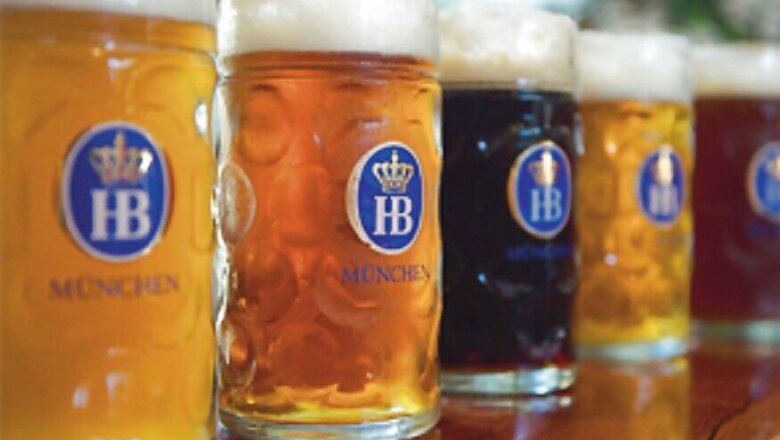
views
 The Hofbräuhaus, Munich.
The Hofbräuhaus, Munich.
You are sitting at the centre of a place, drinking one of the finest beers in the world, quite oblivious of the fact that five hundred years ago, this land was almost a dry patch. Yeah, Bavaria in Germany had a big drinking problem. Their beer sucked. And normal water like in other parts of the Continent was too polluted with deadly germs to drink. Beer was the only solution, and what they had at home, stank. So to keep themselves well-hydrated, the aristocrats had only one option - line up for the beer that came from North Germany. It was insufficient.
The ever thirsty Bavaria had to do something now. On 27th September 1589, the then Duke Wilhelm V commissioned the construction of a brewery in true Bavarian style, a decision meant to reduce expenses on importing beer from the North. The brewery started functioning in the city's old court building by making a top-fermented beer, a kind of brown ale. After the colour of the new drink, the new brewery came to be popular as the Brown Hofbräuhaus.
So at the beginning of the seventeenth century, the members of the Ducal court finally were nourishing themselves with beer made at home. Was it any good?
Sorry, it still couldn't hold a candle to the beers that continued to flow in from the North. At that time, “Ainpöckisch Bier” from the Hanseatic town of Einbeck was the yardstick that people used to measure the standard of their drink.
Maximilian I, when he took charge after Wilhelm as the Duke, insisted that the brewery should include light wheat beers in its portfolio. In 1614, the new Duke made a significant move by successfully weaning Master Brewer Elias Pichler from Einbeck, offering him a huge salary, and asked him to make a beer that should be world-class.
That hit the bull's eye; a new beer - Bockbier - was created and demands soared sky-high. The authorities had to build a larger brewery when even the 38,000 gallons of beer they made per annum were found to be inadequate to quench their thirst.
Meanwhile, money from the Hofbräuhaus formed the chief source of Bavaria's revenue, and rulers were in no mood to do away with their monopoly over the lucrative business. No other breweries were allowed in Bavaria for a long time. Pretty soon, Hofbräuhaus began to brew mailbock, a darker and stronger beer catering to the tastes of ordinary people (It is said that the brewery had successfully stalled a possible pillaging of the city of Munich during the thirty-years war when it promised the ruling Scandinavians, 1000 gallons of bock to keep their hands off).
In 1828, finally, amid much fanfare, the brewery opened its premises to the general public.
Hofbräuhaus was news again in the 20th century when in February 1920, Hitler and Nationalist Socialists gathered in the Festival Hall of the brewery. In the meeting Hitler presented the ill-famed 'Twenty Five Point Programme' that outlined the Nazi philosophy and their lifelong mission to 'deal' with the Jewish problem. Though Hitler remained a teetotaller all his life, ( apart from being a vegetarian) he loved the time he spent at the place.
No wonder, Hofbräuhaus was one of the prime targets of Allied bombing in 1944. The brewery was entirely demolished.
After the World War, in 1958, a new Hofbräuhaus was built, which tried to shed all its affinities with Nazi Germany, but history, being history, clung on furiously to the brewery. Today you only have to look up to the ceiling to see the remains of the murky past (Though the old red flags were repainted with Bavarian flag patterns, they do slightly recall the swastika symbols).
Apart from the Fuehrer, Hofbräuhaus also lured many other celebrities into its liquid embrace during its long stint in history. In the early 20th century, when the brewery was developed as one of the most famous taverns in Europe, Vladimir Lenin began to frequent the tavern. His wife had only high praises for the place that she notes in her diary that Hofbräuhaus is "where good beer wipes away all the social differences between social classes.
Pretty soon, Hofbräuhaus became the headquarters of Bavarian Communist Party. Other celebrities including Mozart and much later down in the 20th Century, John F. Kennedy, Louis Armstrong, George Bush all became habitues to this German brewery that started its operation centuries ago.
Today Hofbräuhaus boasts of having an area of 33,000 square feet, making it one of the largest dining areas in the world. Each day, more than 35,000 people visit the place of which a large part of them are regulars. In fact, there are more than 120 groups of regulars of which the oldest one could regale you with tales of 70 years of their Hofbräuhaus experiences. The tavern also boasts of issuing their own currency - the beer token - which is not subjected to fluctuations in terms of value.
So the next time you fly to Munich, Germany, don't forget to pay a visit to Hofbräuhaus. You can sip beer listening to 500 years of history thrumming from its walls.
(Manu Remakant is a freelance writer who also runs a video blog - A Cup of Kavitha - introducing world poetry to Malayalees. Views expressed here are personal)




















Comments
0 comment